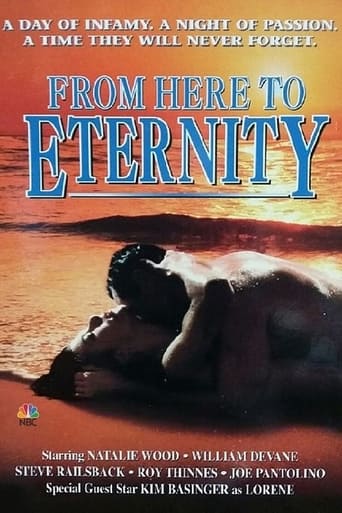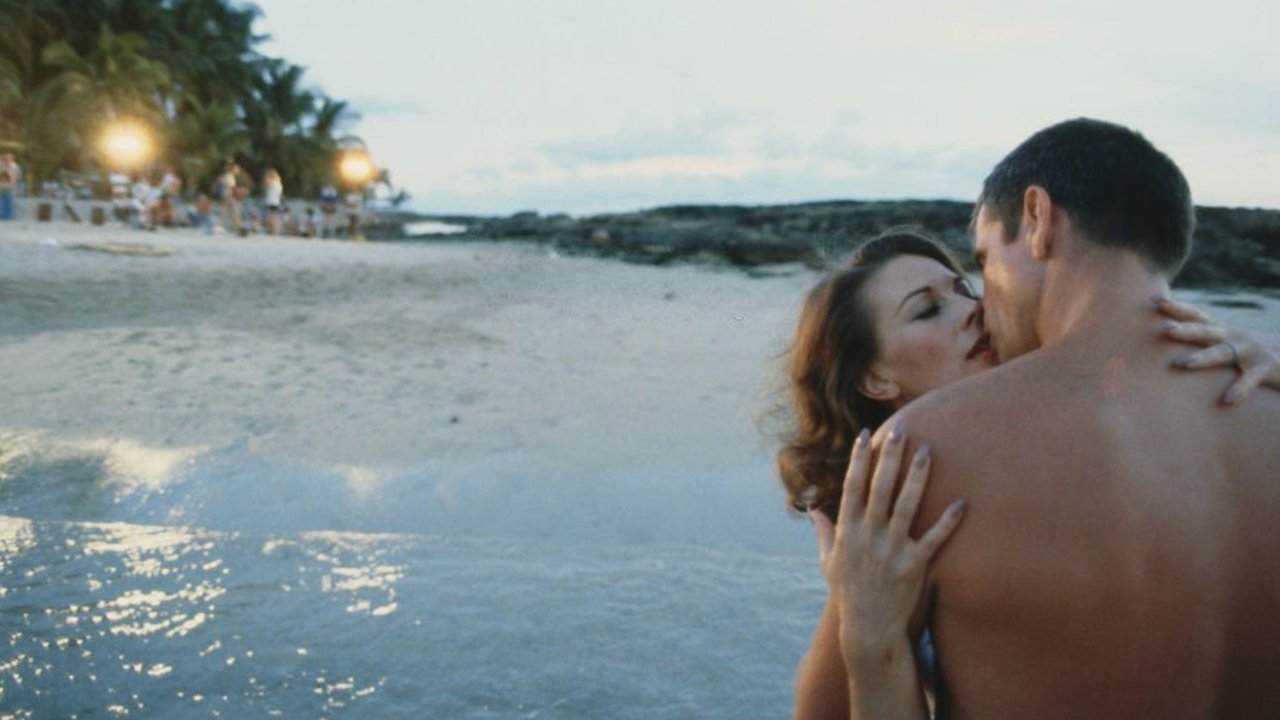Robert J. Maxwell
Every production ought to be assessed on its own merits but in this case it's impossible if you've seen the 20th-Century Fox version (1953) and read James Jones' post-war novel about the Army and the attack on Pearl Harbor. Comparisons creep unwillingly to mind.First, the novel itself that provided the material for both movies was -- I think the style is called "naturalistic." It's extremely brutal, and it's written in a manner that convinces you that Jones knew exactly what he was writing about. And he did. It makes anything by Ernest Hemingway read like a Jane Austen weeper.The 1953 version was a big excellently directed and acted movie with stars like Burt Lancaster (Sergeant Warden), Frank Sinatra (Angelo Maggio), Montgomery Clift (Robert E. Lee Pruitt), Donna Reed (Lorene Rogers), and Deborah Kerr (Karen Holmes). Fred Zinnemann managed the whole thing flawlessly, as did the supporting cast and the crew. But in 1953, the story had to be sanitized and thus debauched. Captain Dynamite Holmes, a perfect, ambitious Arschloch with the philosophy of a fascist, instead of being promoted as in the novel, is forced to resign from the Army. And Donna Reed's whore had to become some kind of traditional "dance hall girl". And, if I remember the novel, Frank Sinatra's character is beaten to death in the stockade, whereas in 1953 he dies accidentally while trying to escape.Some stories need extended treatment and this is one of them. The 1953 film was like a Reader's Digest condensed version. This one has enough time to include more incidents from the novel, that add local color and flesh out the characters in greater detail. It has time, for instance, to send the protagonist, Steven Railsback (Pruitt), to the stockade. And Railsback does a hard three months. The scenes are STILL not as extravagantly violent and strange as in the novel, in which Pruitt learns to meditate while in solitary confinement. I mean MEDITATE, like a Hindu, connected to the real world only by an insubstantial string of sperm, as Jones put it. I hope I'm giving the impression that it's a powerful novel.The tough but fair top sergeant Warden, Burt Lancaster in 1953, William Devane here, are both compelling figures. Devane brings a more relaxed quality to the role, a sense of comme il faut, that's more realistic than Lancaster's brusque authoritarianism. Yet, there's no way of overpowering Lancaster's simple physical presence. He's big, sinewy, muscular in build and in attitude. Devane looks sadly down on Railsback's body and quietly praises him. (Fade out.) In 1953, Lancaster knelt over Clift's body, said something mocking, then turned to the gaping soldiers and shouted, "What's the matter, ain't you ever seen a dead man before? Get this body OUTTA here!" Railsback is no Montgomery Clift. Hardly anybody was in 1953, though Clift was drunk much of the time. But Railsback's intensity, his defiant commitment, is projected by a taut grin through which a few clenched teeth show. Donna Reed won an Academy Award for playing the hooker against type but she was nevertheless miscast. She's the girl next door, if the girl next door lived in Iowa. She can't handle hysterics. Deborah Kerr was cast against type too in 1953, but in her case it works because she's so elegant and lady-like. She's much less sexy but more believable than Natalie Wood in the role of the captain's adulterous wife. When you watch Natalie Wood, you can never quite shake off the realization that you're watching a performance.I enjoyed it. There aren't many TV movies that even come this close to being the equal of the original. I liked it even more because Buzz Kulik was my director in the superb "Too Young The Hero." My performance as a drunken hobo was widely described as peerless, even though I was only on screen for two seconds. In fact, a lot of my co-workers appear here. Joe Pantoliano was my supporting player in the neglected masterpiece, "The Squeeze", and Kim Basinger was the woman who loved me from afar in the poetic "No Mercy." Robert Davi gave me able support in "Raw Deal," a clever adaptation of "The Merchant of Venice," with Arnold Schwarzenegger as Shylock. (Thanks, Bob. I'll never forget your superlative rendition of La Donna e Mobile.) I also helped Andy Griffith get through an episode of "Matlock" but I've forgotten the title, or at least I'm trying to.
moonspinner55
James Jones' novel of overheated lives on a Hawaiian Army Base--just prior to the Japanese bombing on Pearl Harbor in 1941--filtered through the 1953 screenplay by Daniel Taradash before being reworked by new writers Harold Gast and Don McGuire, ostensibly to give the old chestnut some bolder action and sex appeal. There's definitely more skin--and more sinister machismo--on-screen, but by taking on the Oscar-winning theatrical adaptation from '53, one has to wonder just what the producers of this TV mini-series hoped to gain? Luckily, they've got Natalie Wood in the role of the Army Captain's estranged wife (with plenty of movie star allure, Wood gives the part her all, winning a Golden Globe for Best Actress); unfortunately, the rest of the cast is made up of television names (William Devane, Andy Griffith), B-list stalwarts (Roy Thinnes, Richard Bright), wild card newcomers (Kim Basinger, Steve Railsback), and several very odd choices (Peter Boyle as "Fatso", Will Sampson as Corporal Cheney, Joe Pantoliano in Frank Sinatra's signature role of Maggio). Aside from Wood, the best acting comes from muscular Devane as Sergeant Warden (despite his tendency to play hardball by making tough-guy faces) and Railsback, too, is interesting in the ex-boxer role left behind by Montgomery Clift. Railsback approaches the stubborn rebellion of Private Prewitt with understated ease, but the often daft teleplay leaves him in a lurch whenever he's called on to get surly in a bordello or argue with his marriage-minded island squeeze (sample dialogue: "You think I wanna take care of some snot-nosed little brat and work all day in the pineapple fields?!"). Veteran director Buzz Kulik must have felt the pressure to pull off some sort of TV miracle here, but his staging is uneven and cumbersome, most especially in the group scenes when there doesn't even appear to be a director's hand present. Moments of the presentation (278 minutes on video) are pure pap, while the color photography, locations, set designs and costumes appear second rate.
DJAkin
Other than Joe Pants, this movie is so so. It's fun to watch that father from EVERYBODY LOVES RAYMOND as a drill sgt. He gets so mean that he even physically abuses his recruits!!! He is mean!! Like I said, unless you like Joe Pants, see the Ol' Blue Eyes version.
yenlo
I toss a coin when it comes to comparing this TV mini-series to the 1953 big screen version from James Jones novel From Here to Eternity. While this version sticks more closely to the book the casting in the original is generally better. One thing I did notice (possible spoiler) is that in both versions the character Angelo Maggio is killed but in the novel he does not die. Instead (in the novel) it is another character named Blues Berry who is glimpsed in this edition that is the stockade murder victim of the sadistic Sgt Fatso Judson. I saw this version recently on a cable channel that presented it in one complete unedited showing without commercial interruption and I found myself enjoying it more than when I first saw it during its initial TV run. In any case read the novel and see both this mini series and the 1953 classic.


 AD
AD






